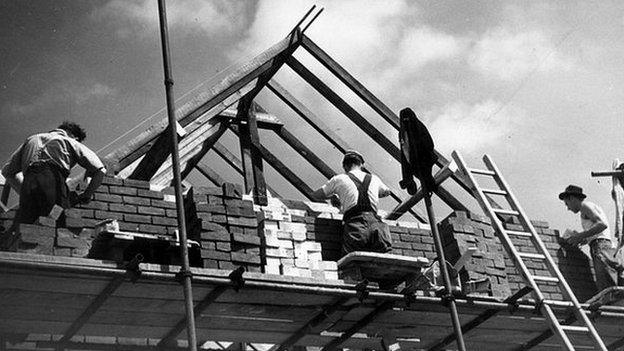Private landlords double housing benefit haul to £9.3bn
- Published

Nearly half of all housing benefit claimants are now in work
Private landlords in the UK received twice as much in housing benefit last year - £9.3bn - as they did a decade ago, a report says.
The National Housing Federation (NHF) study said the increase was due to a big rise in the number of private tenants claiming housing benefit.
The NHF said this particular group of people had grown by 42% since 2008.
In 2006, some £4.6bn in housing benefit was paid to private landlords, a figure which had more than doubled by 2015.
NHF chief executive David Orr said: "It is madness to spend £9bn of taxpayers' money lining the pockets of private landlords rather than investing in affordable homes."
"The lack of affordable housing available means that a wider group of people need housing benefit," he added.
Working poor
Had these housing benefit claimants been living in social housing instead of renting from private landlords, taxpayers would have saved huge sums of money over seven years, the NHF report estimated.
It said that taxpayers paid £1,000 more per year, per family renting in the private rented sector, than they did for those in social housing.
This amounted to an average of £2.2bn a year extra being handed over to private landlords, at a cumulative additional cost of £15.6bn over the past seven years, the NHF analysis says.
If this extra housing benefit bill for just one year had been spent on creating new affordable housing, the NHF added, then nearly 50,000 new homes could have been built.
The report also points out that a larger proportion of families claiming housing benefit in the private rented sector are now in work.
"Today, nearly half (47%) of all families claiming housing benefit in the private rented sector are in work - this is nearly double the proportion it was six years ago (26%)," the NHF said.
'Tenants failed'
A government spokesman said it had been taking action to bring the housing benefit bill under control.
He said: "Since 2012 the amount going to private sector landlords has actually been falling - something which the National Housing Federation fails to recognise."
"We are also committed to building the homes this country needs and investing £8bn to build 400,000 more affordable homes."
Chris Norris, head of policy at the National Landlords Association, said the private rented sector was responding to the increasing demand for homes from a growing proportion of tenants who are being failed by the social housing sector and housing associations.
"The NHF is clearly still reeling from the news that its members have been ordered by government to reduce spending over the next four years, so it comes as no surprise that they are looking to shift the emphasis and point the finger elsewhere," he said.
"However, the private rented sector plays a pivotal role in providing much-needed homes for tenants so there seems no real purpose in the NHF taking a cheap shot at landlords for what is a failure on behalf of successive governments to adequately allocate its housing budget and to incentivise the building of new homes."
- Published9 July 2020

- Published11 August 2015
